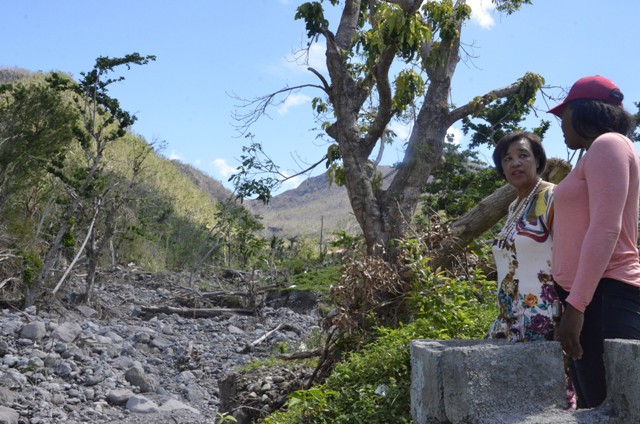 Dormer: "The populations of some small island states are particularly badly affected. " [Photo of Patricia Scotland in Dominica after Hurricane Maria: ComSec]
Dormer: "The populations of some small island states are particularly badly affected. " [Photo of Patricia Scotland in Dominica after Hurricane Maria: ComSec]
[An excerpt from an opinion piece in the Round Table: The Commonwealth Journal of International Affairs]
As I write this at the very end of 2017, the Commonwealth Heads of Government Meeting is only 15 weeks away. We are told that the overall theme will be Towards a Common Future, the aims being that it should be more prosperous, more secure, more sustainable and fairer. I have no doubt that the final communiqué will be drafted thoughtfully and accurately to reflect governments’ firm belief that one should proceed accordingly. But what will actually eventuate in the way of action? Careful planning and even more thorough implementation of agreed arrangements will be essential if these truly excellent objectives are to be achieved.
Commonwealth Summits have always had a broad range of matters on the agenda—every one of them significant. So it will be April 2018. However, I am of the firm view that addressing the dangers of global warming is of pre-eminent and overarching importance. While the aims of the April Summit are splendid, in the absence of sufficient actions to prevent average global temperatures from rising by more than one and a half centigrade degrees, life for the vast majority of humans will become less prosperous, less secure, less sustainable and less fair.
There is general agreement that our species (and many others) will become increasingly vulnerable during this century if the planet continues to heat up. We are already seeing the beginnings of this trend. Many communities in central America, south Asia, Australia, north Africa and southern Europe are currently under stress because of changes in weather patterns. The populations of some small island states are particularly badly affected. Should the world’s temperature continue to increase, the effects would be nothing short of disastrous.
A week can be a long time for politicians, battered as they are by daily events. It is understandable that they are often affected in their decision-making by short-term imperatives. It is left to planners in commercial organisations, military authorities, intelligence agencies and various government ministries to predict what may happen in differing circumstances, in order to plan for all eventualities in the decades ahead. If they are doing their jobs properly, they will translate broad political objectives into scenarios for further research and development.
[Terence Dormer worked at the Commonwealth Secretariat in London from 1971-2003, serving in the Education, Strategic Planning and Political Affairs Divisions, with the Commonwealth Fund for Technical Cooperation (CFTC) and in the Secretary-General’s Private Office.]
Related articles:
The Commonwealth, Climate Change and Coral Reefs – Round Table Journal, 2015.
Terry Dormer looks at coral reefs in Commonwealth waters as indicators of climate change – RCS Commonwealth Voices 2015.
Peace, democracy and good governance: the role of the modern Commonwealth – Paper presented at the 1999 conference of the Commonwealth.



